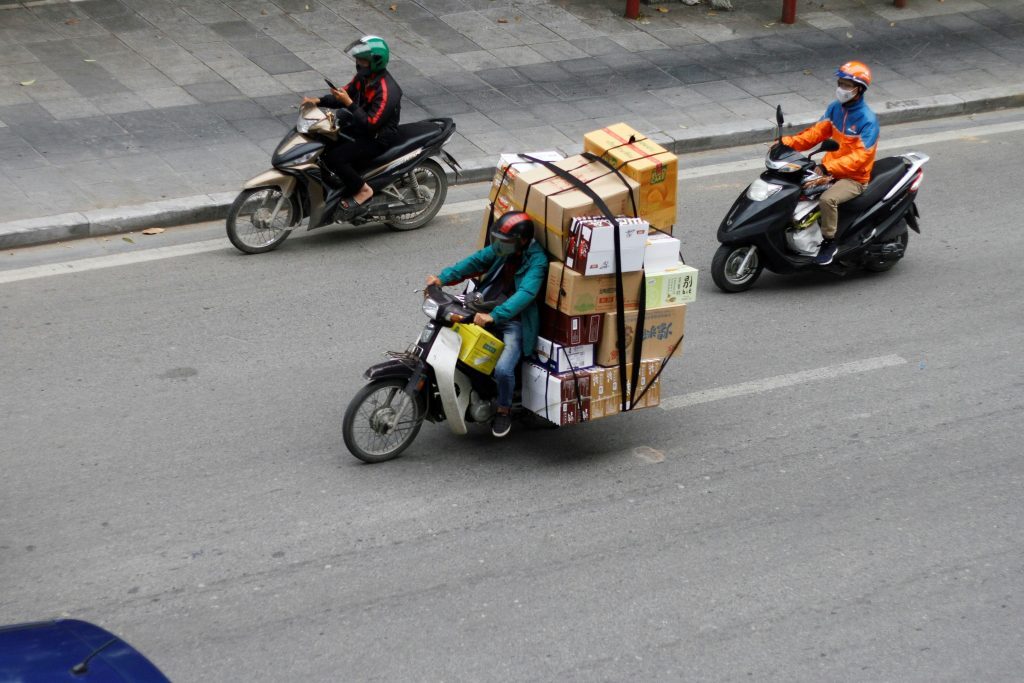Rights On Demand: Asia’s Gig Economy Gets A Legal Upgrade
Sep 29, 2025 | Pratirodh Bureau
Gig workers have been pushed outside the scope of basic protection offered by labour laws, including minimum wages, medical insurance, compensation for illness and injury at the job. But now, things are beginning to change (Photo by Bình Lê on Unsplash)
Gig work, symbolised by crowd work, on-demand work and freelancing, has expanded rapidly worldwide. The convenience of being able to accept work with just a smartphone has provided many with flexible working arrangements.
Behind this sense of convenience for consumers, however, lurk issues such as unstable working conditions and exclusion from social security for the gig workers. Gig workers are usually denied rights as regular employees. Consequently, they have been pushed outside the scope of basic protection offered by labour laws including minimum wages, medical insurance, compensation for illness and injury at the job.
A landmark development for such workers came on September 9, 2025, when Malaysia’s Gig Workers Bill 2025 passed the country’s Senate (Dewan Negara). As the world’s first comprehensive protection bill directly targeting gig workers, it will impact over 1.2 million workers in Malaysia. This Bill will subsequently become law after receiving the King’s approval and with the government’s gazette notification.
A move to significantly transform the state of gig work started in the US and Europe.
In the US, California Assembly Bill 5 (AB5), signed into law on September 18, 2019 and effective from January 1, 2020, made it easier for gig workers to be recognised as employees.
In Europe, Spain became the first country to enact a specific law: the “Rider Law” (Royal Decree-Law 9/2021), adopted on May 11, 2021 and effective from August 12, 2021, made a legal presumption that food delivery riders are employees rather than self-employed.
In Asia, Singapore’s Platform Workers Act came into force on January 1, 2025.
This mandates gig workers to split social security contributions (Central Provident Fund) equally with the platform company, while expanding access to workers’ compensation and medical insurance.
Furthermore, platform operators now bear responsibility for workplace safety. Systems for income protection and accident compensation have also been established.
This formally incorporated gig workers into the mainstream labour protection mechanisms for the first time, having previously been excluded as self-employed individuals.
The approval of Malaysia’s Gig Workers Bill 2025 marks the beginning of substantive institutionalisation of gig worker protection in Asia.
What gig workers will get
The provisions within this Bill can be organised into four categories.
Firstly, provisions concerning service contracts. To enhance contract transparency, it is mandatory for contracts to clearly state the parties involved, duration, scope of work, remuneration, payment method, and rights and obligations.
Second, provisions concerning the rights of gig workers. Just cause is required for dismissal of gig workers and they are guaranteed the freedom to work across multiple platforms, the right to form or join trade unions, as well as the provision of remuneration statements and mechanisms to prevent non-payment.
Third, provisions concerning dispute resolution and tribunals. A three-tier structure is established: internal company grievance mechanism, mediation, and swift, low-cost adjudication by the newly established Gig Workers Tribunal.
Fourth, provisions concerning councils and social security/health and safety. The establishment of councils with equal employer and worker representation grants them the ability to propose minimum remuneration and system reforms.
Additionally, platform companies are obligated to contribute to the Social Security Organisation (SOCSO), clearly ensuring their responsibility for occupational safety and health.
These provisions can be viewed as the “Malaysian hybrid model,” positioned between the European Union’s Platform Work Directive and the employment reclassification model exemplified by the UK and Singapore’s social security extension model.
The passage of this bill followed strikes and protests by the gig workers.
The first major food delivery strike occurred in Klang Valley in 2022, followed by the sustained protest action known as the “Grab Blackout” in 2024. Mobilisation via social media brought the opaque remuneration systems and harsh working conditions to light as societal issues, exerting pressure that moved the government and parliament.
However, this Bill does not represent a complete victory for gig workers.
Major platform companies did not actively show their support for the Bill, and the government, balancing economic growth with worker protection, accepted a compromise solution.
Consequently, while contract transparency and basic social security were achieved, official collective bargaining rights and full employment status were not included. Furthermore, given that the Malaysian Trade Union Congress (MTUC) has requested a postponement of the vote, citing insufficient stakeholder consultation, it is undeniable that, while the bill was the product of multi-layered interest coordination.
Nevertheless, there is no doubt that the initiatives in Singapore and Malaysia have opened new horizons for protecting gig workers in Asia. While imperfect and fluid, Malaysia’s model presents a realistic scenario for emerging economies to regulate platform labour.
The Indian case
However, prior to this national-level institutionalisation, India’s Rajasthan state enacted the Platform Based Gig Workers (Registration and Welfare) Act in 2023.
This legislation mandates the registration of gig workers and aggregators, establishes welfare committees including worker representatives, and creates a social security and welfare fund for gig workers financed by a “welfare levy” collected from platforms per transaction.
Another Indian state of Karnataka has introduced the Karnataka Platform Based Gig Workers (Social Security and Welfare) Bill, 2025.
While ground breaking in legally defining gig workers’ status, their application remains confined to the state level and has not yet been expanded into a national law.
Therefore, the Rajasthan Act can be positioned as a partial precursor to institutionalisation in Asia, contrasting with subsequent reforms in Singapore and Malaysia.
It demonstrates a trajectory for institutionalisation that navigates compromises with existing actors in an environment where reliance on judicial strategies is untenable.
(Published under Creative Commons from 360info.org)
